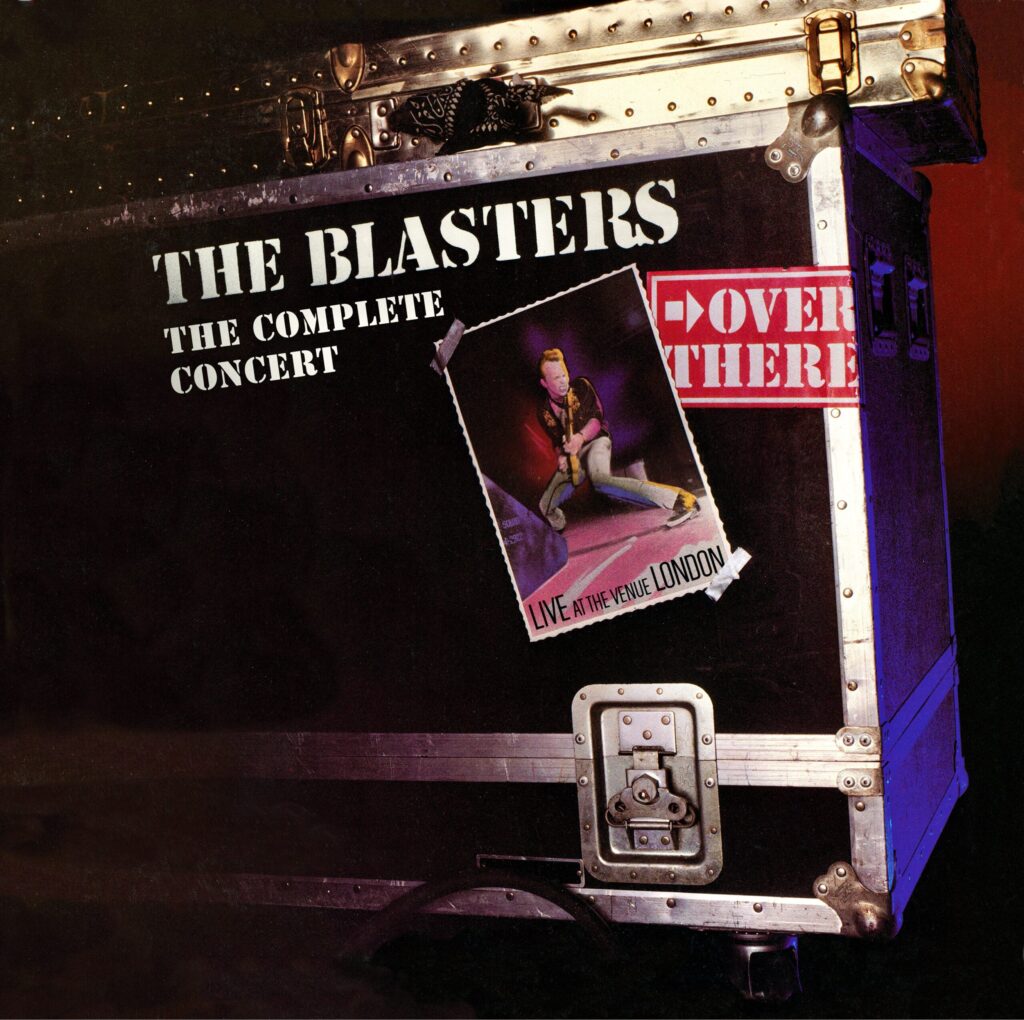Consisting of highly skilled enthusiasts, The Blasters stand tall amongst the very strongest exponents of the stripped down and wild sound that shaped the 20th century heyday of what the band described as American Music. For an extended taste of this outfit’s rare talents, just get in line on Record Store Day Black Friday November 29 for a copy of Over There, Live at the Venue, London – The Complete Concert, which expands a sharp six-song live EP originally released in 1982 to 23 tracks spread across four sides of vinyl. But heads up; only 1,500 copies of this double set were pressed by Liberation Hall, so interested parties should prepare to be disappointed. Demand will definitely exceed supply.
Formed in Downey, California in 1979 by vocalist-guitarist Phil Alvin, lead guitarist Dave Alvin, bassist John Bazz, and drummer Bill Bateman, by the time The Blasters recorded their self-titled second album released by Slash Records in 1981, they’d added boogie-woogie piano specialist and former Canned Heat member Gene Taylor, baritone saxophonist Steve Berlin (a contemporary from the Los Angeles scene) and veteran tenor saxophonist Lee “Walkin’ With Mr. Lee” Allen to the lineup. Upon landing in England to support Nick Lowe, they were a well-oiled machine just bursting with spontaneity and energy.
Perhaps the key component in The Blasters’ artistic success is that they couldn’t sit stylistically still for very long. Over There’s complete performance spans rockabilly, rhythm & blues, country, swamp blues, and soul. But on the downside (for the band; certainly not for listeners), this sheer diversity likely limited their commercial potential. Doing one thing repeatedly, e.g. the neo-rockabilly of The Stray Cats, increases the chances of breaking through, if only briefly. The Blasters had some chart success, but they never took a ride on the flash in the pan rollercoaster.
Although they do still occasionally get tagged as such, categorizing The Blasters as neo-rockabilly is not just reductive, it’s inaccurate. Americana and roots rock are better descriptors, but with a big qualifier that the band’s raw intensity was appreciated by punks the globe over in the early ’80s. Another aspect that’s worthy of comment is their impeccable flow, a characteristic that emanates from the studio albums but shines nowhere brighter than in the compete performance documented on this expanded edition of Over There.
An integral component in this flow is the voice of Phil Alvin, earthy yet soulful in a manner reminiscent of a template vocalist in the roots-Americana field, John Fogerty. Like Fogerty, Phil handled a wide range of styles with gutsy panache but had the good sense to steer clear of mimicry, in turn cluing-in the listener that he was a California guy and a true fan of the music, not a mere trend hopper.
For two contrasting examples, Phil brings his own personality to “Border Radio,” a Dave Alvin original and a country tune at its core, and then late in the set, does the same in a rockin’ soul raveup version of Otis Redding’s “These Arms of Mine.” This pairing compares well to the excellence of Fogerty in Creedence (e.g. the country-funky “Down on the Corner” and the swamp-soulification of “I Heard It Through the Grapevine”). In covering a slew of songs, there is still no mistaking The Blasters for anybody else.
Through exceptional consistency of tone, brother Dave accomplishes something similar on guitar. In addition to his own group, the man played in X and X offshoot The Knitters, The Flesh Eaters, and even The Gun Club. It’s fair to say Dave was in demand, but he sounds nowhere better than in The Blasters, and they were in top form the night Over There was captured. But equally important is Dave Alvin’s strength as a songwriter. Every original song from The Blasters is heard on Over There including “Marie Marie,” the band’s best known tune at that point and a big hit for Shakin’ Stevens in the UK.
And then there is “American Music.” Few bands have a song that expresses their very reason for existing quite like this one. It was the title track of their first (pre-Slash) album, released in 1980, but they cut it again for The Blasters with the expanded lineup, not due to a lack of material but because the addition of Taylor, Berlin, and Allen articulated the essence of American Music even more effectively.
It’s the sound of bar walking honkers and bangers of the 88s throwing down in smoky joints deep into the night. It’s also the sound of seven cats who hopped aboard a jet and got it done Over There.
GRADED ON A CURVE:
A
